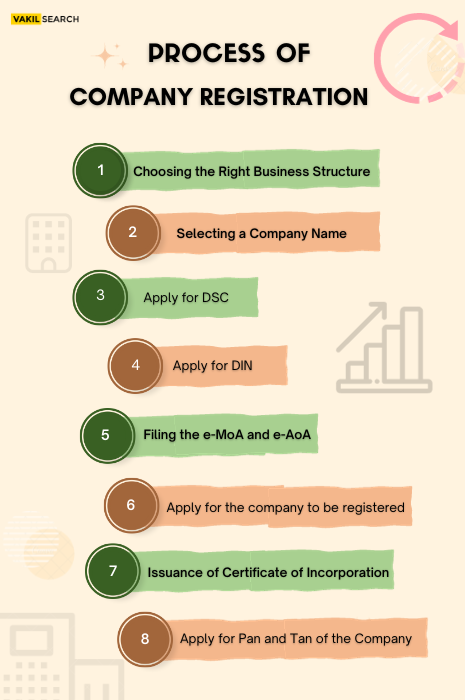To incorporate a private limited company, follow these steps: choose a unique name, prepare legal documents (MoA and AoA), appoint directors, register with the company registrar, and obtain a Certificate of Incorporation. This process ensures limited liability, legal recognition, and growth potential for your business.
Incorporating a private limited company is a crucial step for entrepreneurs looking to safeguard personal assets, build credibility, and unlock opportunities for growth. This process transforms your business into a recognized legal entity, offering limited liability, enhanced trustworthiness, and access to capital—a major advantage over sole proprietorships or partnerships.
This guide provides a step-by-step roadmap to successfully incorporate your private limited company, covering everything from legal documentation and registration to compliance and tax identification. Designed with entrepreneurs, startups, and small business owners in mind, it answers key questions and simplifies complex procedures.
By the end of this article, you’ll have actionable insights and a clear path to formalizing your business structure. Whether you’re starting fresh or upgrading your existing business model, this comprehensive guide is your one-stop resource to navigate the incorporation process effectively.

Advantages of a Private Limited Company:
Businesses that intend to grow quickly and expand across, prefer private limited companies as it offers a wide range of advantages over the other entities like:
- A private limited company is a separate legal entity and is different from its members. The company can purchase property of its own and can sue and be sued in its own legal capacity
- A company has perpetual succession and lives on forever unless it is legally dissolved.
- A private limited company exhibits limited liability wherein the members of the company are accountable for the debts only to the extent of shares they hold.
- The shares held by the shareholder are easily transferable to another person.
- A private company is relatively in a better position to seek funds from banks and financial institutions as compared to other corporate entities.
Requisites for the Registration of a Private Company:
- A private limited company must have a minimum of 2 and a maximum of 200 shareholders.
- There should be a minimum of 2 directors and there can be a maximum of 15 directors.
- In the case of a private limited company, there are no mandatory requirements for minimum paid-up capital.
- The directors and shareholders have to furnish their proofs of identity with government authorized identity cards such as PAN (Permanent Account Number) card or Aadhar card.
- The proof of address such as telephone bills, electricity bills that are not older than two months from the date of submission is to be presented.
- Address proof of the registered office such as water bills, electricity bills to be submitted.
- If the office is situated on a rental space, a NOC from the owner and the rental agreement is to be submitted.
- If the office is spaced out in its own property, the property deed is to be enclosed.
Procedure to Incorporate a Private Company

The company formation process in India is relatively simple and can be completed online. The following are the steps involved:
- Choosing the Right Business Structure: The first step is to choose the right business structure for your business. The most common business structures in India are sole proprietorship, partnership, and private limited company.
- Selecting a Company Name: Once you have chosen the right business structure, you need to select a company name. The company name must be unique and cannot be the same as the name of any other existing company.
- Apply for the Digital Signature Certificate (DSC): A DSC is a digital signature that is used to authenticate electronic documents. You can apply for a DSC from any licensed certification authority.
- Apply for the Director Identification Number (DIN): A DIN is a unique identification number that is issued to individuals who intend to become directors of companies in India. You can apply for a DIN online.
- Filing the e-MoA (INC-33) and e-AoA (INC-34): The e-MoA and e-AoA are the documents that set out the constitution of the company. You can file the e-MoA and e-AoA online.
- Apply for the company to be registered: Once you have filed the e-MoA and e-AoA, you need to apply for the company to be registered. You can apply for company registration online.
- Issuance of Certificate of Incorporation: Once your company has been registered, you will be issued a Certificate of Incorporation. The Certificate of Incorporation is the official document that certifies the existence of your company.
- Apply for PAN and TAN of the company: Once you have received the Certificate of Incorporation, you need to apply for a Permanent Account Number (PAN) and Tax Account Number (TAN) for the company. You can apply for a PAN and TAN online.
Further, after having received the Certificate of Incorporation, an account in the name of the company has to be set up in an authorized bank to carry out the financial transactions of the company.
Thus, the first and foremost step in a business is to incorporate a company, thereby giving it legal recognition through the registration of a company in India. This would undoubtedly bestow the company with credibility and goodwill. Although the procedure involved in registering a company looks tedious, getting in touch with our experts for registering the company can make the process much more bearable. Here at Vakilsearch, we totally understand how important the business is to an entrepreneur and handle the registration services with high precision and complete it at the earliest.



